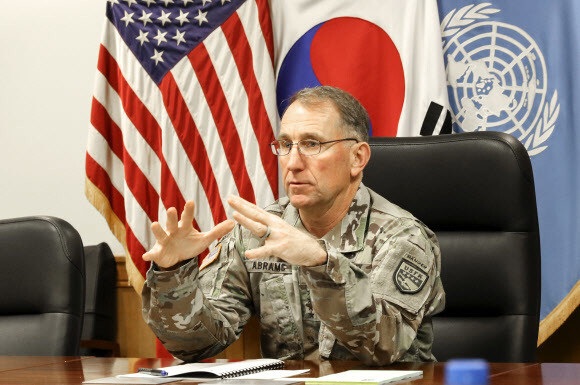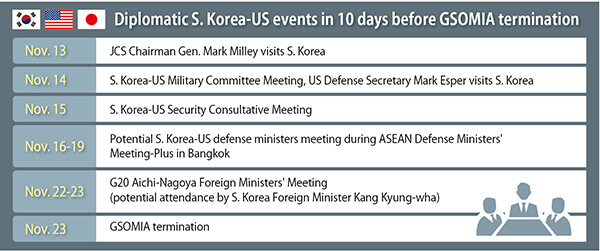hankyoreh
Links to other country sites 다른 나라 사이트 링크
[News analysis] The US’ pressure to extend GSOMIA lacks any gesture of respect for S. Korea

The US is cranking up pressure on South Korea to extend its General Security of Military Information Agreement (GSOMIA) with Japan, which is supposed to end at 12:01 am on Nov. 23. Even though the Moon administration has publicly said several times that it won’t change its position on GSOMIA until Japan lifts its export controls on South Korea, the US continues to demand an extension. Despite South Korea being a key US ally in Northeast Asia, the Americans aren’t saying anything about respecting its decision on this matter.
Pressure from the US is likely to reach its peak during its Security Consultative Meeting with South Korea in Seoul on Nov. 15. The US will send senior officials from the US Defense Department and military, including Defense Secretary Mark Esper, Joint Chiefs of Staff Chairman Gen. Mark Milley, and Robert Abrams, commander of US Forces Korea (USFK).
While the meeting’s official agenda is covering a security assessment of the Korean Peninsula and the transfer of wartime operational control (OPCON) of South Korean troops, the next question revolves around Washington’s attitude toward Seoul’s GSOMIA withdrawal. South Korean President Moon Jae-in will reportedly be meeting with Esper at the Blue House on Nov. 15, and GSOMIA is expected to be a major part of their discussion.
It’s all but certain that the US means to turn the screws on Korea. During a meeting with Japanese Prime Minister Shinzo Abe the day before arriving in South Korea on Nov. 13, Milley reconfirmed the need to extend GSOMIA. In interviews with Japanese newspapers, including the Nov. 13 edition of the Nikkei, MIlley said that terminating GSOMIA would fulfill China and North Korea’s desire to drive a wedge between South Korea, Japan, and the US and that his message to Korea is that he won’t let the agreement lapse.
During a press conference with domestic and foreign reporters at Camp Humphreys in Pyeongtaek on Nov. 12, Abrams expressed concerns about South Korea’s plan to pull the plug on GSOMIA. Without GSOMIA, the USFK commander said, “there is a risk of sending the wrong message that perhaps we are not as strong [as we once were].”
There are few examples in the history of the South Korea-US alliance of the US objecting so tenaciously to a decision by Seoul. Immediately after the Moon administration’s announcement in August that it would withdraw from GSOMIA, the US declared “strong disappointment and concerns,” and since then it has continued to pressure South Korea for an extension. The US didn’t even back off when Blue House National Security Office Director Chung Eui-yong declared on Nov. 10 that “GSOMIA is an issue for South Korea and Japan to resolve, an issue that’s completely unrelated to the South Korea-US alliance.”
“Even though the Blue House has explicitly stated its position on ending GSOMIA, American officials keep pushing for an extension. That clearly shows how crucial GSOMIA is to US interests,” said Lee Soo-hyoung, research fellow at the Institute for National Security Strategy.

Washington’s true intentions were revealed by its reference to the “wrong message” that failing to extend GSOMIA could send Korea’s neighbors. While Abrams didn’t specifically mention other countries in the region, Milley said that it’s “clearly in China’s interests and North Korea’s interests to separate South Korea from Japan and the United States.” This constituted an acknowledgment that US demands to extend GSOMIA are linked with the Indo-Pacific Strategy, which the US hopes to use to contain China.
“This shows that GSOMIA is ultimately a link in the chain of trilateral cooperation between South Korea, the US, and Japan that’s aimed at containing the rise of China,” Lee said.
The US’ current attitude is inconsistent with the claim it made when persuading South Korea to reach an information-sharing agreement with Japan in 2016, that GSOMIA is designed to share intelligence about North Korean nuclear weapons and missiles and thus has nothing to do with China. This confirms speculation that joining GSOMIA would ultimately serve as a stepping stone toward building a missile defense system between South Korea, the US, and Japan aimed at China. In short, extending GSOMIA goes beyond merely restoring security cooperation and is also linked to the American strategy of forging a trilateral alliance against China.
Indo-Pacific Strategy fundamentally contradicts S. Korea’s long-term interestsExperts believe that this American strategy is fundamentally opposed to South Korea’s long-term interests. It also clashes with the “Three Noes” declared by the Moon administration; namely, its promise not to host any more THAAD anti-missile batteries, not to enter an American missile defense system, and not to join a trilateral alliance with the US and Japan. It may also go against efforts to build a peace regime on the Korean Peninsula through cooperation with Korean neighbors.
“The current American actions are designed to achieve its interests, and not to mediate in the South Korea-Japan conflict. South Korea needs to respond from the perspective of maintaining stability in Northeast Asia and building a peace regime on the Korean Peninsula,” Lee said.
American unilateralism is also evident in its requests for South Korea to increase its defense cost-sharing contribution to nearly US$5 billion in the two countries’ negotiations about renewing their cost-sharing agreement, set to expire this year. The US seeks to force South Korea to shoulder a much larger share of the defense burden, with the hope of setting an example for other allies and preempting any resistance on their part.
Referring to the defense cost-sharing negotiations, Abrams noted that he agreed with recent comments made by US Ambassador to South Korea Harry Harris, who said that the South Korean government has the ability to pay more and ought to do so. Once again, the US has shown no interest in the principle of sharing the defense cost in a reasonable and fair way.
In the end, American demands are designed to incorporate South Korea into its Indo-Pacific Strategy, a plan to contain China. The Indo-Pacific Strategy is intended to weave American allies into a net surrounding China and to force those allies to shoulder the huge costs this strategy would entail.
“The US’ central goal is convincing South Korea to participate fully in the Indo-Pacific Strategy. That will require South Korea preserving GSOMIA and massively increasing its defense contribution,” said Cho Sung-ryul, a research consultant for the Institute for National Security Strategy.
South Korea’s conservative press and the Liberty Korea Party are stirring up fears of a crisis in the South Korea-US alliance, arguing that if South Korea doesn’t go along with American demands, the US might scale down its troop presence in South Korea or withdraw altogether. Some experts say that, if South Korea allows GSOMIA to expire, the US could intensify pressure for South Korea to increase its defense cost-sharing contribution.
“There are serious concerns even within the US that President Trump is harming American alliances. There are no grounds to claims that the US will remove troops from South Korea if GSOMIA is terminated,” Cho said.
Cho did acknowledge that GSOMIA’s expiration could lead the US to express its dissatisfaction through increasing pressure for a higher defense contribution, delaying the OPCON transfer, or limiting South Korea’s ability to acquire state-of-the-art weaponry.
By Park Min-hee, staff reporter, and Cho Ki-weon, Tokyo correspondent
Please direct comments or questions to [english@hani.co.kr]

Editorial・opinion
![[Column] Season 2 of special prosecutor probe may be coming to Korea soon [Column] Season 2 of special prosecutor probe may be coming to Korea soon](https://flexible.img.hani.co.kr/flexible/normal/500/300/imgdb/original/2024/0426/3317141030699447.jpg) [Column] Season 2 of special prosecutor probe may be coming to Korea soon
[Column] Season 2 of special prosecutor probe may be coming to Korea soon![[Column] Park Geun-hye déjà vu in Yoon Suk-yeol [Column] Park Geun-hye déjà vu in Yoon Suk-yeol](https://flexible.img.hani.co.kr/flexible/normal/500/300/imgdb/original/2024/0424/651713945113788.jpg) [Column] Park Geun-hye déjà vu in Yoon Suk-yeol
[Column] Park Geun-hye déjà vu in Yoon Suk-yeol- [Editorial] New weight of N. Korea’s nuclear threats makes dialogue all the more urgent
- [Guest essay] The real reason Korea’s new right wants to dub Rhee a founding father
- [Column] ‘Choson’: Is it time we start referring to N. Korea in its own terms?
- [Editorial] Japan’s rewriting of history with Korea has gone too far
- [Column] The president’s questionable capacity for dialogue
- [Column] Are chaebol firms just pizza pies for families to divvy up as they please?
- [Column] Has Korea, too, crossed the Rubicon on China?
- [Correspondent’s column] In Japan’s alliance with US, echoes of its past alliances with UK
Most viewed articles
- 1AI is catching up with humans at a ‘shocking’ rate
- 2The dream K-drama boyfriend stealing hearts and screens in Japan
- 3‘We must say no’: Seoul defense chief on Korean, USFK involvement in hypothetical Taiwan crisis
- 4[Column] Season 2 of special prosecutor probe may be coming to Korea soon
- 5Is N. Korea threatening to test nukes in response to possible new US-led sanctions body?
- 6Is Japan about to snatch control of Line messenger from Korea’s Naver?
- 7[Column] Can we finally put to bed the theory that Sewol ferry crashed into a submarine?
- 8S. Korea “monitoring developments” after report of secret Chinese police station in Seoul
- 9Doubts remain over whether Yoon will get his money out of trip to Japan
- 10Up-and-coming Indonesian group StarBe spills what it learned during K-pop training in Seoul